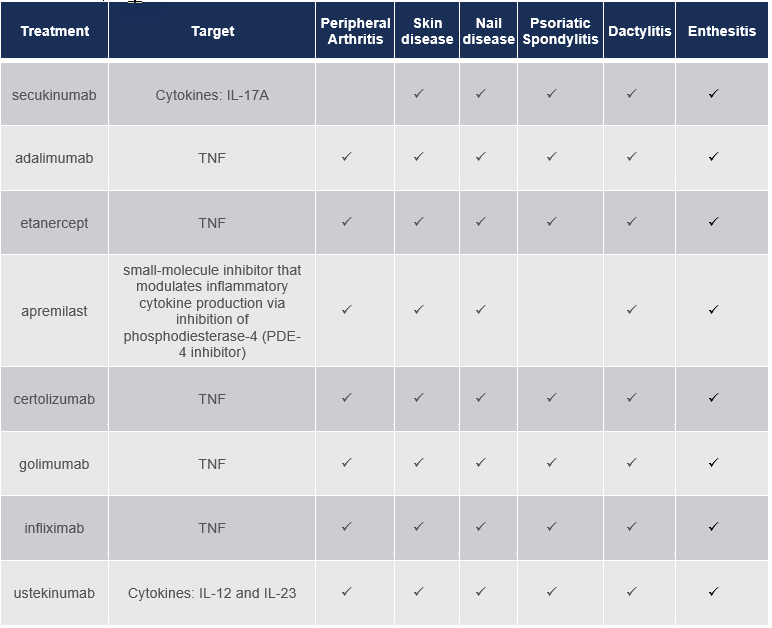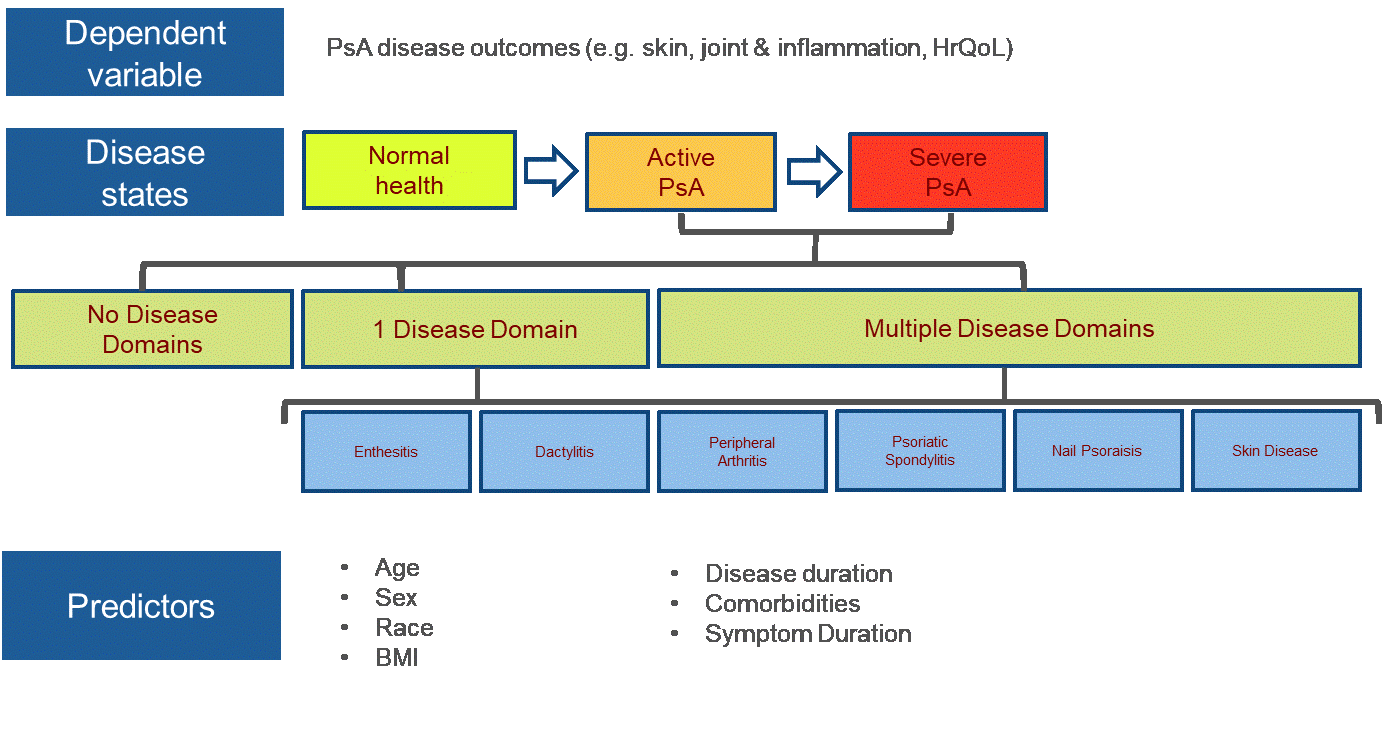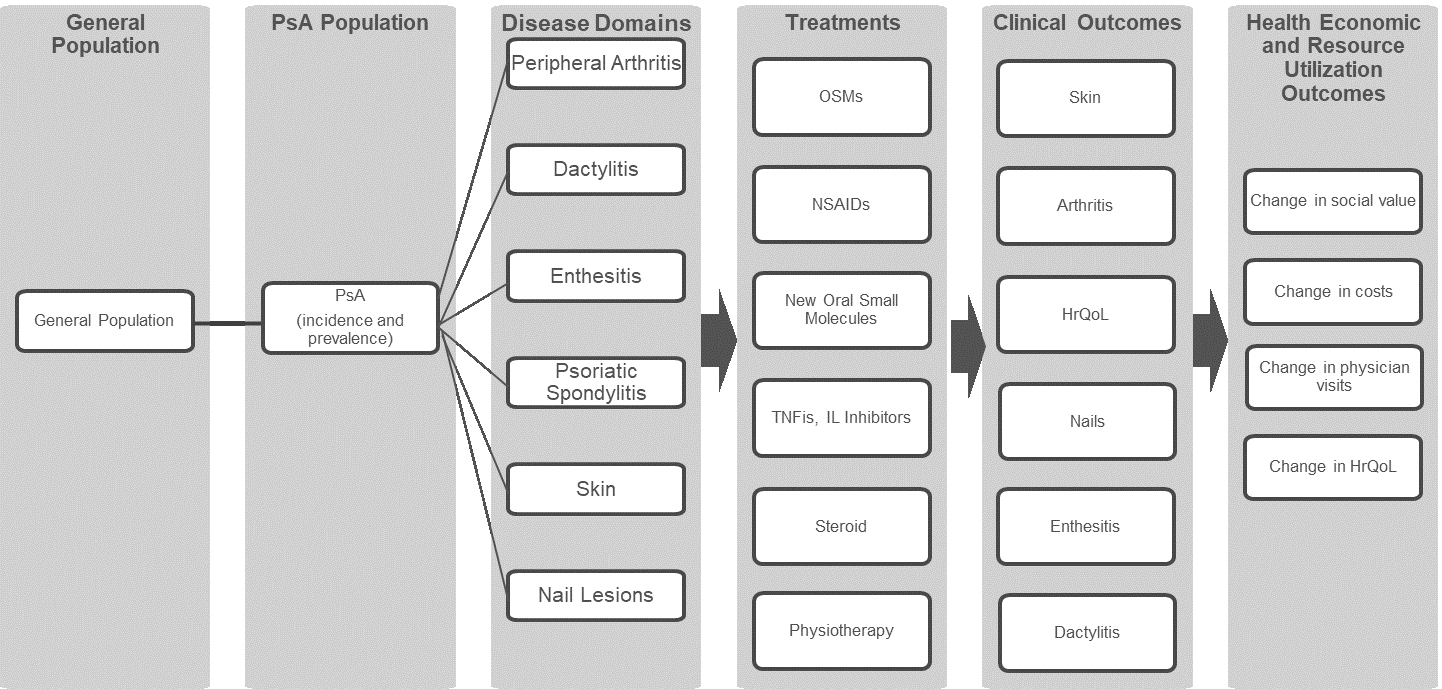Session Information
Session Type: Poster Session B
Session Time: 9:00AM-11:00AM
Background/Purpose: Psoriatic arthritis (PsA) manifests heterogeneous signs and symptoms (e.g., dactylitis, enthesitis, axial involvement, skin- and nail disease), which may respond to treatments differently. While a wide variety of treatments are available for psoriatic arthritis (PsA), variability in treatment response across different patient types is not well-documented. Understanding patient heterogeneity and its consequences on outcomes is critical to making appropriate treatment decisions. Our objective is to characterize the heterogeneity of PsA and develop a conceptual framework to explore the therapeutic and financial impacts of specific treatments on these five PsA manifestations.
Methods: We conducted a narrative literature review to determine the key prevalent PsA disease domains. We present the existing evidence base to measure the treatment effects of existing PsA treatments on the various disease domains. Finally, we propose an economic modeling framework that could estimate the economic value of treatments for addressing specific PsA disease domains.
Results: The key prevalent disease domains in PsA include peripheral arthritis, dactylitis, enthesitis, psoriatic spondylitis, skin, and nail lesions. However, the evidence base for the effect of a specific treatment on a given domain was less robust, as was the comparative evidence base of how existing market PsA treatments perform on one or more disease domains relative to each other (Table 1). Our review of clinical trials and the literature of the relevant outcomes also found no comparative effectiveness analysis of PsA domains. Our economic modeling framework to estimate the economic value of treatments for addressing specific PsA disease domains requires further clinical and real-world evidence to be generated on the relative efficacy or effectiveness on each disease domain. Given the evidence challenges, we would suggest a cohort-level model, with potential parallel modeling for the different disease domains, to estimate total social value calculated as quality-adjusted life-years as well as the cost per grouped outcome and changes in cost per symptom avoided. An individual/patient-level simulation would be the ideal design to represent patient heterogeneity but may not be feasible due to limited available data. As PsA is a chronic lifelong disease, we propose that this model use a lifetime horizon. We believe that a model as outlined in Figure 1-2 would provide valuable economic input to help inform treatment decision making.
Conclusion: Psoriatic arthritis is a heterogeneous disease, with patients presenting a variety of disease manifestations. A more granular understanding of the interaction between disease domains and treatments, such as the one proposed in Figure 3, would benefit both providers and patients in making value-based, personalized treatment decisions.
 Table 1. Identified outcomes in PsA disease and the GRAPPA treatment guidelines specifying which disease domains are treated using specific treatments.
Table 1. Identified outcomes in PsA disease and the GRAPPA treatment guidelines specifying which disease domains are treated using specific treatments.
 Figure 1. PsA Outcome Risk Model Components
Figure 1. PsA Outcome Risk Model Components
 Figure 2. Treatments and clinical outcomes can be grouped by type to simplify the conceptualization of PsA disease manifestation and treatment.
Figure 2. Treatments and clinical outcomes can be grouped by type to simplify the conceptualization of PsA disease manifestation and treatment.
To cite this abstract in AMA style:
Chou J, Maksabedian E, Collier D, Thom H. A Proposed Economic Framework to Model the Consequences of Psoriatic Arthritis Disease Domains [abstract]. Arthritis Rheumatol. 2020; 72 (suppl 10). https://acrabstracts.org/abstract/a-proposed-economic-framework-to-model-the-consequences-of-psoriatic-arthritis-disease-domains/. Accessed .« Back to ACR Convergence 2020
ACR Meeting Abstracts - https://acrabstracts.org/abstract/a-proposed-economic-framework-to-model-the-consequences-of-psoriatic-arthritis-disease-domains/
